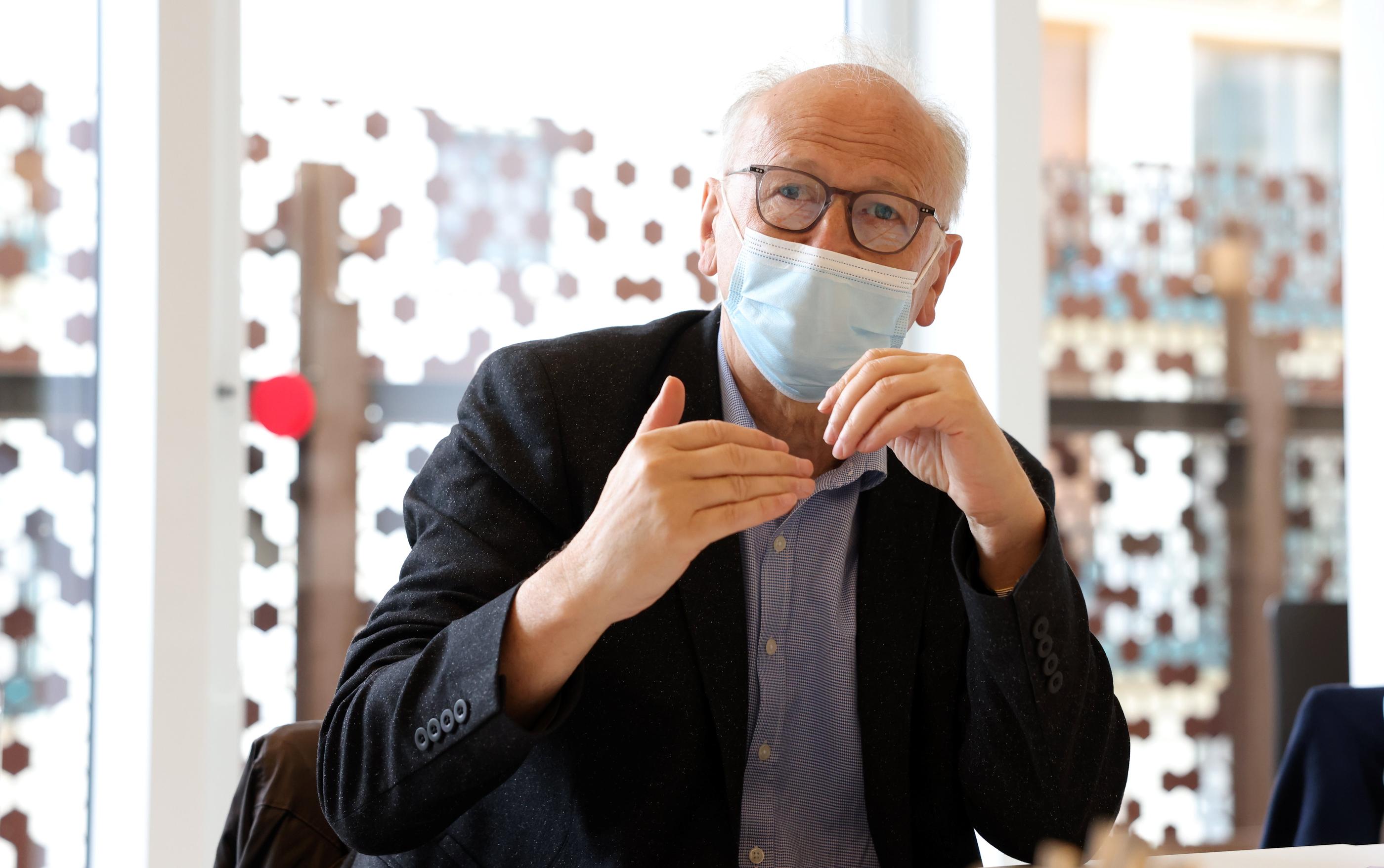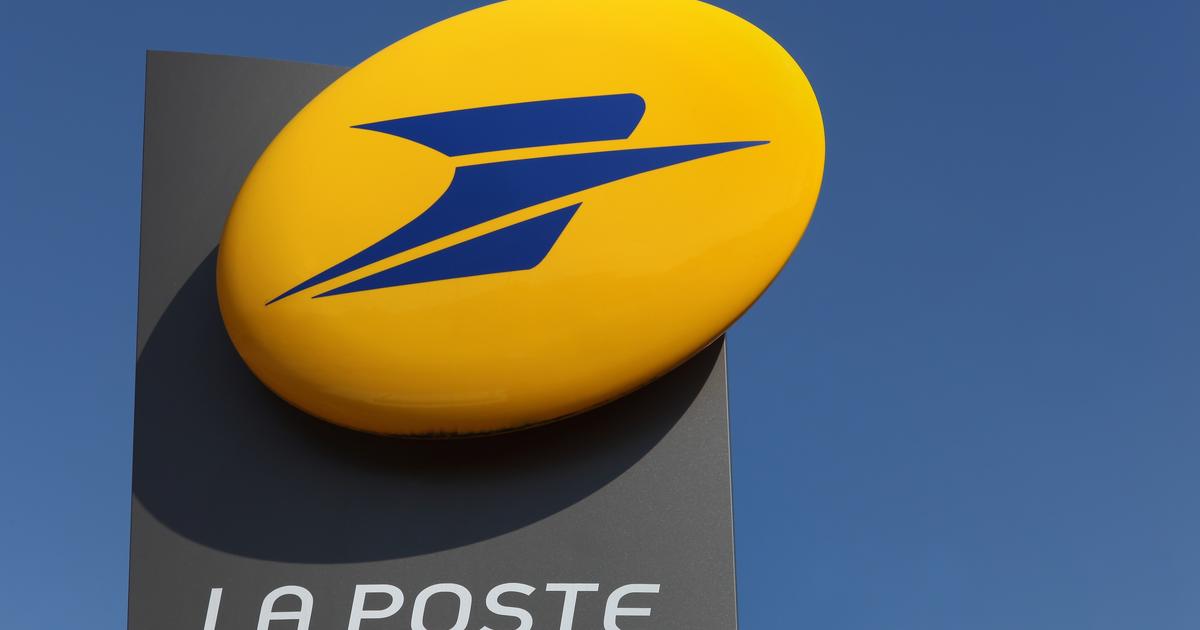Before being the government's “Mister vaccine”, Professor Alain Fischer was a pediatrician for a very long time in Necker (Paris), at the bedside of the most fragile children.
Perhaps that is why he expresses himself with pedagogy and simplicity.
In front of six of our readers, he knows it: he is there to explain the strategy and remove doubts.
His "obsession", he confides, to convince of the need - in the long term - to all go through the bite box.
“I'm counting on you,” he says to the two “young people” of our panel, Hakaroa, 16 years old and Romain, 24 years old.
An incentive to become ambassadors for vaccination.
Yes, but the doses still need to be there for everyone.
And even if Emmanuel Macron promised this Thursday an opening of vaccination to over 50s from May 12 and paved the way
when it comes to immunizing the 16-17 year olds most at risk, the French only believe what they see.
For Alain Fischer, all the lights of this acceleration are green.
25 million doses could be administered in the months of June and July alone.
This would allow a gradual return to normal life.
His goal: "to take off the mask by the end of the summer."
"
YOUTH AND VACCINES
Hakaroa Valley
.
I am 16 years old, I have type 1 diabetes and since this Thursday morning, France has authorized vaccination for certain 16 and 17 year olds.
Can I also claim it?
ALAIN FISCHER.
Not right away, no.
The vaccination of adolescents has been authorized from the age of 16 in France since Thursday with Pfizer, because studies have shown that this vaccine is safe and effective at that age.
But this concerns adolescents at high risk of severe form of Covid.
Your diabetes is an indisputable aggravating factor, but less than others, such as an organ transplant, heavy chemotherapy, certain rare genetic diseases.
Telling you when it's your turn is glue.
I hope as soon as possible.
The United States is also thinking about it for those under 16.
Are you in favor of immunizing children?
In principle yes, but there is no question of taking the slightest risk. On the effectiveness, there is little doubt because the immune system of children is good, and even better than that of adults. What you need to check is security. Based on the results of a reassuring Pfizer study, Canada has decided to apply it and the United States is considering it for 12-15 year olds. For those under the age of twelve, clinical trials are starting. We must also distinguish sick children from others. For transplant recipients, or people with Down's syndrome, for example, who have an increased risk of a severe form of Covid, I hope that the vaccination will be done as soon as possible. For those in good health, the risk of severe form is very, very low, but their vaccination would contribute to
collective immunity and would allow the virus to no longer find a candidate to infect.
The debate is open, the discussion will really take place this fall.
Read alsoCovid-19: what if we vaccinate young people as a priority?
Romain Peyron
.
A vaccination for all, from May 12 according to "the remaining doses" was announced by Emmanuel Macron.
I am 24 years old, can you guarantee me an injection on that date?
Unfortunately no.
You are right to try your luck, but the number of available doses remains lower than the requests.
Perhaps, this measure will affect a few tens of thousands of people, and it is still taken.
But the “real” enlargement to all will take place in mid-June.
Yet 40% of 18-24 year olds have an anxiety or depressive disorder.
Why does this kind of statistic not push the government to open up the vaccination of young people more quickly?
In an ideal world, everyone should have been vaccinated straight away.
The reality is that there weren't enough doses, even though it is increasing.
We have therefore chosen to immunize the most vulnerable first in order to reduce the number of hospitalizations and deaths as quickly as possible.
If young people were vaccinated first, it would be at the expense of the most vulnerable people.
Their suffering is real and respectable, but it is less than the risk to life for the elderly, which is terrible.
A person over 80 who contracts the Covid has an 8 to 10% risk of dying from it.
Read alsoDepression, suicidal thoughts ... when confinement makes the youngest crack
My whole age group will not want to be vaccinated.
How to convince her?
This is the most important current question!
It is in the personal interest of young people, some of whom develop a long Covid which poisons them.
But also in our collective interest, for group immunity and the return to normal life.
How to convince?
With young people who take over at university, at work, in their families ... I think that at your age, we listen more to a friend than the President of the Republic or even less to a doctor like me.
When the time comes, spots will be dedicated to the youngest.
The goal is to get actors, rappers and athletes talking.
Mbappé would be ideal (laughs).
PODCAST.
Sick of Covid for 8 months, Amélie is still not healed: "I feel trapped in my body"
THE ASTRA CASE
Marc Masson.
I had the Covid in August 2020 while being asymptomatic.
I'm going to get vaccinated ...
And besides, you will only need one dose like all people who have already had the Covid.
The professor of medicine defends the use of the AstraZeneca vaccine despite the low risk of thrombosis.
LP / Arnaud Journois
Marc Masson.
I'm 61, so eligible for Astra, but I would prefer Pfizer.
Can i choose?
The answer is no.
For those over 55, this vaccine has a fantastically positive benefit-risk ratio.
It protects in the same way as Pfizer and Moderna.
I recall that in France, there have been twenty-eight known cases of thrombosis
for 3.5 million people vaccinated with AstraZeneca.
At the collective level, if we gave people the option of not using it, it would delay the vaccination campaign.
Hundreds of thousands, if not millions of people, would therefore have their vaccine later.
Mechanically, some would get sick, and even die.
Those eligible for AstraZeneca must therefore be vaccinated.
Otherwise, we'll lose lives.
Léonor Teixeira.
I just had this vaccine, and in the process, chills, fever, tachycardia.
Suddenly, my doctor advises me not to do the second dose with AstraZeneca…
These side effects can happen with any vaccine.
But with Astra, we also know that they are less frequent during the second dose.
The principle therefore remains, two doses of Astra, twelve weeks apart.
Read alsoVaccinate under 55s with AstraZeneca?
5 minutes to understand a hot debate
Alexis Blanco.
Wouldn't there be an anti-thrombosis vaccine without side effects?
In medicine, whether it is drugs or vaccines, there is nothing that is perfect.
The fact is that today we have vaccines that are more than 90% successful, when those for influenza do not exceed 50%.
In one year, it's extraordinary.
Claudine Canale.
50% of hospital beds are occupied by obese people.
However, around me, many people still could not be vaccinated.
If this is the case, it is not normal and it must be reported to your regional health agency or to the ministry.
Today, all obese people, like all those with a risk factor, are eligible for vaccination.
They must therefore be able to obtain an appointment without difficulty.
Are there vaccines more suitable than others if you suffer from a chronic pathology?
Based on data from clinical trials that included overweight people, there is no evidence that one vaccine is better than another.
On the other hand, for the profoundly immunocompromised, such as organ transplant recipients or patients with autoimmune diseases, there clearly, RNA vaccines must be used.
THE WAIVER OF PATENTS
Claudine Canale.
Joe Biden, President of the United States, defends the idea of lifting patents in order to increase access to vaccines.
And you ?
I am in favor of it!
Symbolically first, but above all ethically, it is not possible not to vaccinate the whole world.
It is also in our interest, because if the disease were to persist with large outbreaks, as currently in India or Brazil, new variants could emerge and strike us in return.
But this cannot be done with a wave of a magic wand because even if the patents were lifted to allow poor countries to produce vaccines, more people would have to be trained, new factories built, and above all material recovered in quantity. already limited globally.
Alexis Blanco.
Why is Europe not producing even more doses?
Europe is far from being a bad student when it comes to production.
We can regret, on the other hand, its lack of investment in the development of vaccines, unlike the United States which has put billions on the table.
On the positive side, this is the first time that the 27 Member States have acted together on health issues.
It's not nothing.
To read also Thierry Breton: "France will embark on a massive production of vaccines as of this week"
Hakaroa Valley.
Why does France not have its vaccine?
France does not weigh more than 5% of world biomedical research.
It is more than our population in proportion, but I would like it to devote more investment to it.
Nevertheless, it is not excluded to see a Sanofi or Valneva vaccine arrive within a few months.
THE VARIANTS
Leonor Teixeira.
What do we know about the Indian variant?
Are current vaccines effective?
When viruses multiply, small errors can appear in their genetic code, such as spelling mistakes in a dictation.
Most of these changes are of no consequence.
In some cases, however, this can make it more contagious or more resistant.
Regarding
the Indian variant, there is no direct link between its appearance and the gravity of the current situation in India.
But having emerged recently, there is still a lack of data to answer this question.
It appears to closely resemble the South African and Brazilian variants, the resistance to vaccination of which is of little concern.
Would we be able to cope with the arrival of new variants in the coming months?
What is most to be feared is a new variation on an already existing one.
A South African variant, for example, which would change further to become more resistant to the immune response, and that would pose a serious problem.
Be careful, we think there is little chance that this will happen.
But if this were the case, manufacturers are already preparing with vaccines no longer based on the genetic code of the initial virus, but on that of one of its mutants.
In order to create a vaccine closer to the new virus.
This is what we do with the flu every year.
And it works.
The good news is that messenger RNA vaccines can adapt very quickly, in a matter of weeks.
According to Alain Fischer, it is likely that a booster of the vaccine against the Covid-19 must be done each year.
LP / Arnaud Journois
Marc Masson.
Will it be necessary to be vaccinated again against the Covid every year, even after having received the two doses?
This is arguably the most likely scenario.
Although we will have to wait a little longer to find out more about how long the vaccines last.
Initial data from Pfizer and Moderna shows that they are still effective after six months.
Read alsoVaccination against Covid-19: second, third dose, reminder ... the questions that arise
Alexis Blanco.
Could too many vaccinations have an impact on our "natural" immunity, like what we see with antibiotics?
No.
Of course, by being immunized, we put additional selective pressure on the virus.
This can promote the emergence of a more resistant virus.
But if we didn't vaccinate, it would be even worse.
People would get sick, the virus would spread widely, and then find an even greater opportunity to resist.
Between not or too much vaccinated, so there is no photo.
THE EXIT FROM THE CRISIS
Romain Peyron.
Countries will be opened this summer (Greece, Croatia, Iceland), without restriction, to people vaccinated.
Will young French people be at a disadvantage compared to older people, already vaccinated, who will be able to get there more easily?
This disadvantage will be temporary and limited.
From June 15, everyone will be able to be vaccinated.
In June and July, more than 25 million doses could also be administered.
If people agree to be vaccinated - I come back to this point because it obsesses me - then the majority of the population will be immunized before the end of the summer.
In addition, a health passport and not just a vaccine will be put in place.
It will give you the right to travel if you are vaccinated, have had the disease in the past, or have a negative test.
And I certainly hope that there will be a common passport for all of Europe!
Hakaroa Valley.
When will we be able to free ourselves from the masks?
This is the last step.
To get out of this epidemic, the system rests on two feet: that of vaccination and that of physical and distancing measures.
All the studies show that if you do one without the other, you won't get out of it.
If everyone has their own;
from policies to health professionals to the population, this should be achieved.
The goal: to drop the mask at the end of the summer!
Marc Masson.
Do you hope to be able to eradicate this virus permanently or do you fear an even more deadly mutation within a few years?
The probability of eradication is almost zero.
In modern microbiological history, the only virus eradicated, after colossal vaccination efforts, is smallpox.
But it is very difficult, even for polio, there are still a few cases… Measles also because unfortunately people do not get enough vaccinations.
It is therefore illusory to think that we will get there in the short term for the coronavirus.
But this is not necessarily embarrassing.
The most probable hypothesis is not the emergence of a very aggressive variant, even if we cannot exclude it ... but rather that it attenuates and that it behaves like the other coronaviruses, in giving us simple colds.
Alain Fischer and the readers of our journal
Around Alain Fischer, from left to right:
Claudine Canale, 60, chief accountant and obesity patient-expert, Massy (Essonne)
;
Romain Peyron,
24 years old, lawyer, Suresnes (Hauts-de-Seine);
Léonor Teixeira, 56 years old, without profession, Paris (XIII);
Alexis Blanco, 52, restaurateur, Paris (20th century);
Marc Masson, 61, retired, Savigny-sur-Orge (Essonne);
Hakaroa Vallée, 16, high school student, Puteaux (Hauts-de-Seine).









/cloudfront-eu-central-1.images.arcpublishing.com/prisa/Z45E6KV7VJGUXAKJWH7VA4NJSE.jpg)




